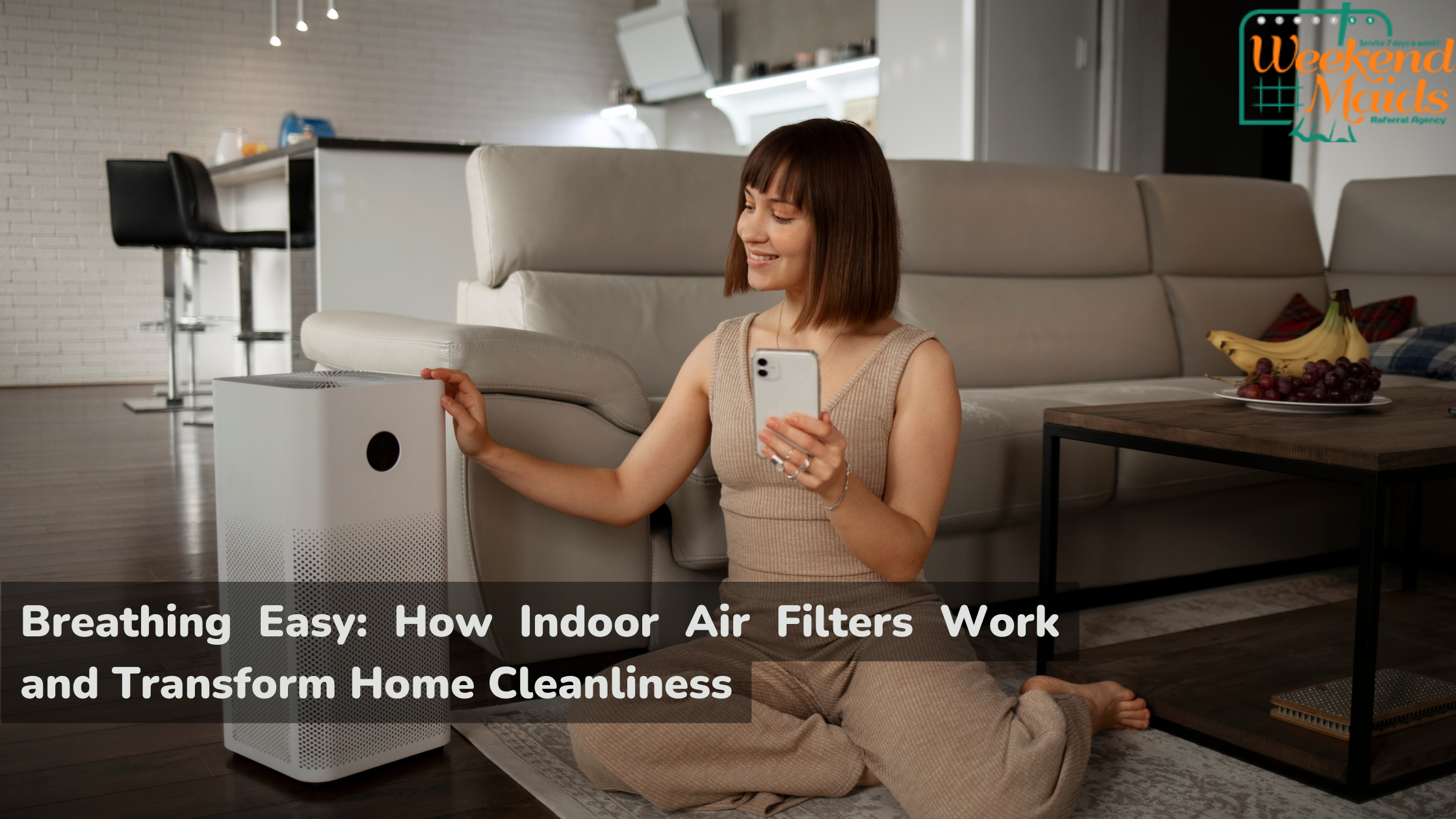
Breathing Easy: How Indoor Air Filters Work and Transform Home Cleanliness
Invisible to the naked eye, indoor air pollutants can silently affect our health and the cleanliness of our homes. However, thanks to advancements in technology, indoor air filters have become a crucial tool in maintaining a clean and healthy living environment. In this comprehensive guide, we’ll delve into how indoor air filters work and the profound impact they have on the cleanliness of your home.
Understanding Indoor Air Pollution
Before we dive into the workings of indoor air filters, let’s grasp the significance of indoor air quality and its impact on home cleanliness:
Common Indoor Pollutants
Indoor air can contain various pollutants, including:
- Dust and Allergens: Tiny particles that settle on surfaces and trigger allergies.
- Pet Dander: Flakes of skin shed by pets that can accumulate.
- Volatile Organic Compounds (VOCs): Gases released by household products.
- Mold and Mildew: Fungi that thrive in damp conditions and can cause odors and surface damage.
- Smoke: From cooking, tobacco, or other sources, leaving odors and staining.
- Pollen: Entering homes through open windows and settling on surfaces.
Effects on Home Cleanliness
Poor indoor air quality can lead to various cleanliness-related issues:
- Dusty Surfaces: Airborne particles settle on furniture, floors, and other surfaces, requiring frequent cleaning.
- Stale Odors: Lingering odors from smoke, cooking, or pets can persist.
- Allergen Accumulation: Allergens like dust mites and pet dander can build up, affecting indoor air quality and cleanliness.
How Indoor Air Filters Work?
Indoor air filters, also known as air purifiers, work to remove pollutants from the air. They utilize various technologies to accomplish this task:
Mechanical Filtration
HEPA Filters: High-Efficiency Particulate Air (HEPA) filters capture particles as small as 0.3 microns, effectively removing dust, pollen, pet dander, and even some bacteria and viruses.
Activated Carbon Filters
Chemical Adsorption: Activated carbon filters adsorb gaseous pollutants like VOCs and odors, trapping them within the porous structure.
Ultraviolet (UV) Germicidal Irradiation
Microbial Control: UV-C light kills or inactivates bacteria, viruses, and mold spores, helping to maintain a clean and healthy environment.
Electrostatic Precipitators
Charged Particles: These devices give particles an electrical charge, causing them to adhere to collection plates or grids, effectively removing them from the air.
The Impact on Home Cleanliness
Now that we understand how indoor air filters work, let’s explore their significant impact on home cleanliness:
Dust Reduction
Fewer Dust Particles: By trapping dust and allergens, air filters reduce the amount of dust settling on surfaces. This translates to less frequent cleaning, making house cleaning in San Diego, CA more manageable.
Odor Removal
Effective Odor Control: Filters equipped with activated carbon can remove odors from cooking, pets, and other sources, leaving your home smelling fresh and clean.
Allergen Control
Reduced Allergen Buildup: Air filters capture allergens like pet dander and pollen, preventing them from accumulating on furniture and floors. Utilizing these filters can complement services for house cleaning in Poway.
Mold and Mildew Prevention
Mold Mitigation: By removing mold spores from the air, air filters can help prevent mold growth, reducing the need for extensive cleaning and remediation.
Improved Indoor Air Quality
Healthier Environment: Cleaner air means a healthier living environment, with fewer allergens and pollutants circulating. For those looking for comprehensive solutions, our Maid Referral Agency in San Diego can help.
Choosing the Right Indoor Air Filter
To maximize the impact of indoor air filters on home cleanliness, consider these factors when selecting one:
Filter Type
- HEPA: Ideal for capturing particles like dust and allergens.
- Activated Carbon: Effective for removing odors and chemicals.
- UV-C: Suitable for microbial control.
Room Size
Choose an air purifier with a capacity appropriate for the room size.
Noise Level
Consider noise levels, especially if the filter will be placed in a bedroom or living area.
Maintenance
Check filter replacement and maintenance requirements to keep the system running efficiently.
Conclusion: A Cleaner, Healthier Home
Indoor air filters are not only essential for improving indoor air quality but also for enhancing the cleanliness of your home. By understanding how they work and selecting the right one for your needs, you can significantly reduce dust, allergens, odors, and pollutants in your living space. This not only reduces the time and effort required for cleaning but also creates a healthier and more pleasant environment for you and your loved ones to enjoy.
Breathe easier and live cleaner with the power of indoor air filters. For more insights on keeping your home clean, explore the difference between post-construction and general house cleaning, and consider Weekend Maids for your cleaning needs.
